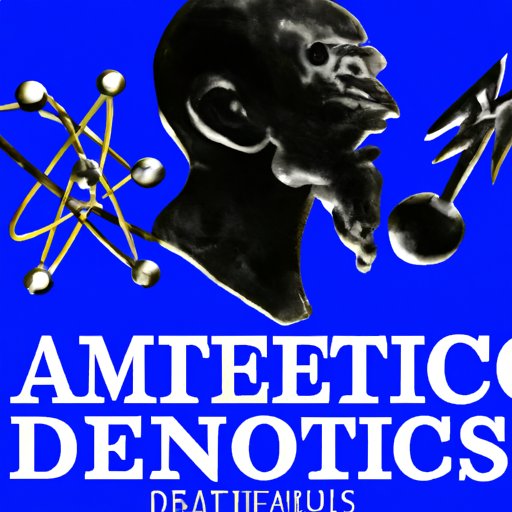
Introduction
Democritus lived in ancient Greece, around the 5th century BCE. He was a student of the famous philosopher Leucippus and is thought to be the originator of the atomic theory. According to Democritus, atoms were the smallest, indivisible particles that made up everything in the universe.
The purpose of this article is to understand why Democritus’ ideas about atoms were not accepted during his time and why it took until the 19th century for atomic theory to be widely accepted.
Historical Context
During Democritus’ time, ancient Greek culture and philosophy were heavily influenced by scientific thinking. Philosophers like Plato and Aristotle were trying to understand the universe and made significant contributions to the study of science. Despite this, science during this period was still in its infancy, and there was a lack of experimental evidence to support theories.
It is essential to understand the historical context in which Democritus proposed his ideas. Ancient Greek philosophers were not solely interested in science. There was a strong focus on the role of the gods in the universe, and many Greeks believed that natural events were due to divine intervention. This belief system is in contrast to modern science, which emphasizes the role of natural laws in the universe.
The influence of ancient Greek culture and philosophy on scientific thinking greatly affected the acceptance of Democritus’ atomic theory. Many ancient Greeks believed that all matter was composed of the four elements: earth, air, fire, and water. This belief system was in conflict with Democritus’ theory, which proposed that matter was composed of tiny particles that were indivisible.
Lack of Experimental Evidence
During Democritus’ time, there were limited experimental methods to test scientific theories. This lack of evidence hindered the acceptance of Democritus’ theory. He had no way to experimentally prove that atoms were the building blocks of the universe. In contrast, other theories, like Aristotle’s, had more experimental evidence and were therefore more widely accepted.
Aristotle’s theory proposed that matter was continuous and not composed of indivisible particles. This theory was more popular than Democritus’ idea because Aristotle had significant experimental evidence to support it. Aristotle’s views were also in line with the ancient Greek belief system, which was more focused on the role of the gods than natural laws.
Societal and Philosophical Beliefs
As mentioned earlier, ancient Greeks believed that the universe was controlled by the gods. This worldview conflicted with Democritus’ theory, which proposed that natural events were due to natural laws, not divine intervention. The concept of atoms was also in opposition to the belief that matter was composed of four elements.
Ancient Greek society may have also hindered the acceptance of Democritus’ theory. The society was hierarchical, and the elites, who often held positions of power and influence, were not interested in scientific theories that contradicted their beliefs. This lack of support from the upper class had a substantial impact on the lack of acceptance of Democritus’ atomic theory.
Resistance to New Ideas
Resistance to new ideas is a common phenomenon throughout history. During Democritus’ time, the scientific establishment was conservative and skeptical of new theories. This resistance was because of the lack of experimental evidence and because new ideas often challenged established beliefs.
The resistance to new ideas is evident in other scientific theories as well. For example, Galileo’s theory of heliocentrism, which proposed that the Earth revolved around the sun and not the other way around, was met with significant resistance. Nevertheless, Galileo’s theory is widely accepted today because of ample experimental evidence to support it.
Complexity of Democritus’ Theory
Democritus’ theory was complex and difficult to understand. This complexity may have contributed to the lack of acceptance of his theory. His contemporaries may have struggled to grasp the scientific significance of his theory, leading to skepticism and non-acceptance of it.
It was not until the rise of the Enlightenment era that scientific knowledge was more widely disseminated, and a better understanding of Democritus’ atomic theory was possible. The Enlightenment also brought a change in the way people thought about the universe, moving from the belief that natural events were due to divine intervention towards a view that emphasized the role of natural laws.
Lack of Technological Advancements
Democtritus’ atomic theory lacked technological advancements to confirm or disprove it. The tools available during his time were limited, and many of the experiments he proposed were impossible to conduct with the available technology.
Modern discoveries in science have confirmed Democritus’ theory and provided evidence of the existence of atoms. For example, the invention of the electron microscope and other advanced imaging technologies have allowed scientists to visualize atoms and study their behavior.
Influence of Rival Theories
Democritus’ ideas about atoms were not the only theories proposed during his time. Other philosophers, such as Aristotle, proposed rival theories. Aristotle’s theory had more experimental evidence to support it, and the Greek beliefs were more in line with Aristotle’s theory.
Despite this, Democritus’ atomic theory has influenced other scientific thought throughout history. His ideas were rediscovered during the Enlightenment era and went on to influence the development of modern atomic theory.
Conclusion
In conclusion, Democritus ideas about atoms were not accepted during his time. The lack of experimental evidence, societal and philosophical beliefs, resistance to new ideas, and complexity of his theory contributed to the lack of acceptance of his ideas. However, despite the challenges, Democritus’ atomic theory has significantly influenced modern science and remains one of his most significant contributions to the field.
It is essential to consider the historical and social context when evaluating scientific theories. It is also important to acknowledge the limitations of the technology and experimental methods available at the time. By understanding the context in which scientific theories were proposed, we can better appreciate the significance of these ideas and their impact on modern science.




